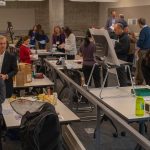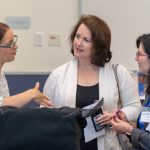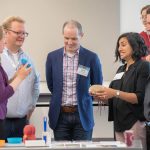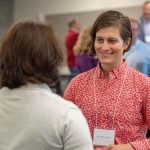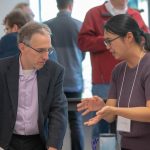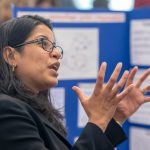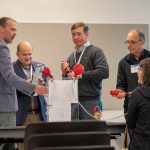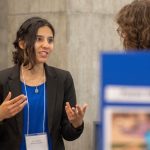An Afternoon of Cutting Edge Research
STEP Forward fellows and STEP alumni who were also Pacific Science Center’s Science Communication Fellows shared their research and hands-on activities with local business leaders and policymakers in a networking event at UW Bothell on June 22nd, 2018, with the collective goal of showing them their diversity and the need for evidence-based decision-making and policies.
- “An Afternoon of Cutting-Edge Research” was held on June 22nd, 2018 at UW Bothell. (Photo by Marc Studer, UWB)
- Dr. Suzanne McDermott sharing her activity with Rep. Shelley Kloba & Ms. Hyre from Clark Nuber P.S. (Photo by Marc Studer, UWB)
- Rep. Slatter talking with Dr. Amy Stone. (Photo by Marc Studer, UWB)
Washington State Representatives Shelley Kloba (District 1) and Vandana Slatter (District 48), Senator Jamie Pederson’s Legislative Assistant Penka Culevski (District 43), and members of the Seattle Metropolitan Chamber of Commerce attended the event and talked with the Fellows about their research and the activities that they had developed to teach the general public about cutting-edge science and using scientific evidence to make discoveries and inform decisions.
- Dr. Sarah Morgan presenting her activity on antibiotic resistance to members of the Seattle Metropolitan Chamber of Commerce. (Photo by Marc Studer, UWB)
- Dr. Atom Lesiak talking with Rep. Shelley Kloba about how neurons work. (Photo by Marc Studer, UWB)
- Dr. Eva Ma explaining her activity on CRISPR-Cas9 gene editing technology to a member of the Seattle Metropolitan Chamber of Commerce. (Photo by Marc Studer, UWB)
- Dr. Vasudah Sundaravaradan speaking passionately about science. (Photo by Marc Studer, UWB)
- Members of the Seattle Metropolitan Chamber of Commerce “pumping it up” at Dr. Will Driscoll’s activity about the heart. (Photo by Marc Studer, UWB)
- Dr. Parisa Hosseinzadeh explaining how drugs are designed. (Photo by Marc Studer, UWB)
This event was hosted by Dr. Becca Price, our STEP executive director, along with Kelly Snyder, Assistant Vice Chancellor for Government & Community, and STEP mentors Dr. Salwa Al-Noori and Dr. Eva Ma. All the Fellows received lots of positive feedback from the attendees, and several of the business leaders wished they had more time to visit and talk with more researchers. Overall, this networking event was a success.
Program and Participants
The following is a listing of the STEP Forward participants and descriptions of their interactive activities developed with the Pacific Science Center. To prepare for this event, STEP Forward fellows had also attended an afternoon training session with Kelly Snyder on policymaking, government, and how to communicate with legislators. Each Fellow created a short takeaway handout with a short biography, their research and areas of expertise, and the issues that were important to them. Some of these handouts can be downloaded by clicking on the Fellows’ names below.
The complete program is available and can be downloaded here.
Dr. Alexandre Neves – Fred Hutchinson Cancer Research Institute
Science on the fly: Have fun learning the life cycle of fruit flies, connecting visible traits with genes, and also how flies can teach us about brain development and disease. They’re more that just a nuisance in our compost bins!
Dr. Amy Stone – Center for Innate Immunity and Immune Disease, UW
Molly the Macrophage: Help Molly the Macrophage figure out what to do with the pieces of debris she found while patrolling the body.
Dr. Atom Lesiak – Psychiatry and Behavioral Sciences, UW
Talk to a Brain Cell: Have fun learning the language of the brain. Interact with a model brain cell to learn how brain cells communicate and change. See how brain cell activity and shape are affected by disease.
Dr. Elizabeth Kwan – Genome Sciences, UW
DNA Building Blocks: Our cells keep their instructions in DNA molecules. Help copy a new set of genetic information to pass on to a new cell. Learn how mistakes can change appearance, function, and health.
Dr. Eva Ma – School of Science, Technology, Engineering, & Mathematics, UW Bothell
Gene Hacking – Changing DNA with CRISPR: How can changes in DNA help scientists study how cells work? What is gene editing and how is it done? Come help us “fix” a gene and learn about the gene-editing technology CRISPR that is revolutionizing biology.
Dr. Parisa Hosseinzadeh – Biochemistry and Institute for Protein Design, UW
Let’s design a medicine: Come learn about how medicine works and design your own medicine to fight diseases.
Dr. Ruth Thomas – Genome Sciences, UW
How Cells Keep Clean and Recycle: Exploring the ways the cell takes care of broken proteins by fixing them or recycling them.
Dr. Sarah Morgan – Microbiology, UW
Superbug – The Origin Story: Explore how bacterial growth and mutation can protect the bacteria from antibiotics. Learn about how antibiotics can be used effectively to fight infections.
Dr. Suzanne McDermott – Center for Infectious Disease Research, UW
Play with Parasites: Have fun learning about the life of deadly sleeping sickness parasites. Come play with parasites and mold their amazing ability to make big life changes!
Dr. Vasudah Sundaravaradan – BioQuest Program Director, Center for Infectious Disease Research, UW
Fighting the camouflage artist – Plasmodium: This hands-on game about malaria helps you learn the malaria life cycle and how to fight the parasite.
Dr. Will Driscoll – Fred Hutchinson Cancer Research Institute
Pump It Up – Matters of the Heart: What happens to your heart after a heart attack? Come play with glitter sticks and balloons to learn how blood clots can damage your heart.
Dr. Zin Khaing – Neurological Surgery, UW
What is your spinal cord good for? Learn how the spinal cord works to communicate sensory and motor information. Interact with a snap-circuit spinal cord model and build your very own neurons.

